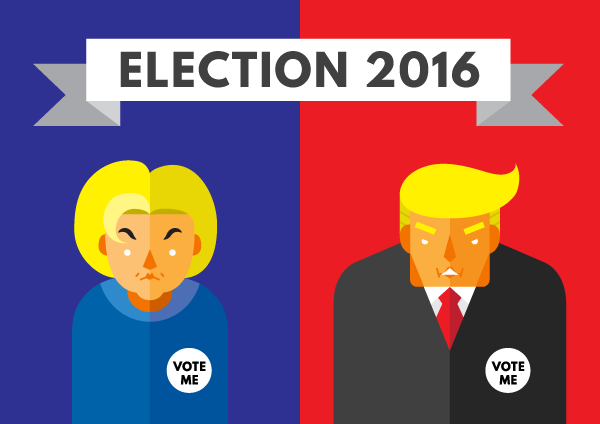Trump vs. Clinton and the Tax Plans We Could End Up With

If someone asked you to explain the differences between the two presidential candidates’ tax plans would you be able give a clear explanation? If you answered “no” most likely you aren’t alone. It’s not uncommon during a presidential election for most voters to be confused at what the candidates are actually promising or proposing. With so much back-and-forth rhetoric, it’s hard to know what each candidate really has in store.
According to Donald Trump, he wants to reduce taxes for everyone in America, especially middle-income Americans. According to numerous reports, Mr. Trump’s plan would reduce the tax system to just three tax brackets, with the top rate dropping from its current mark of 39.6 percent down to 33 percent. He also said that the wealthy would still pay their fair share, but not so much that it hinders the country’s ability to compete.
On the other hand, Hilary Clinton has yet to describe in detail what her tax plans for the middle class would be, or how they would be affected. However, she has made it clear that she wants to raise taxes on the ultra wealthy. Mrs. Clinton has stated that she wants anyone who makes more than a million dollars a year to pay a minimum of 30 percent, whether it’s from income or from capital gains. She would also like anyone who makes more than $5 million to pay an extra 4 percent.
Under Mrs. Clinton’s plan the top 1 percent would end up paying three-fourth’s of the additional taxes being collected, whereas under Mr. Trump’s plan the wealthy would be getting a tax cut of about 5.3 percent. Meantime, both candidates reportedly agree on eliminating the carried interest loophole that offers hedge fund managers a heavily discounted tax rate. Lastly, Mr. Trump wants to eliminate the estate tax completely, while Mrs. Clinton wants to raise it, as well as lower the threshold at which it starts to apply.
http://www.npr.org/2016/09/12/493573601/do-hillary-clinton-and-donald-trumps-tax-proposals-add-up
Tax Planning and Income Tax Return Preparation Services
Tax Planning and Income Tax Return Preparation Services Greenstein Rogoff Olsen & Co. is a full service provider of tax services and offers solutions to clients in the Corporate, Estate and Trust, Individual, Limited Liability Company, Not for Profit, Tax Exempt, Partnership, and S Corporation income tax areas. The primary objective of our tax services…
§1031 Exchanges Combined with Seller Carryback Notes
§1031 Exchanges Combined with Seller Carryback Notes By Steve Chacon Occasionally sellers are approached with the request they carry back an installment note to finance the purchase. Not a bad idea from a “big picture” perspective, as seller financing has been effective in environments where credit is a concern and interest rates are rising. But…
Venture Capital Alternative for Technology Entrepreneurs
If you are an entrepreneur with a small technology based company looking to take it to the next level, this article suggests an alternative that may be of particular interest to you. Your natural inclination may be to seek venture capital or private equity to fund your growth. According to Jim Casparie, founder and CEO…
Startup Fundraising – Do You Know Who You Are Talking To?
Startup Fundraising – Do You Know Who You Are Talking To? Venture capital, private equity, mezzanine debt, venture debt, angel money, investment bank? What’s the difference and who are the players? Many people start looking for funding and become involved with investment bankers or business brokers without really understanding what they are looking for or…




